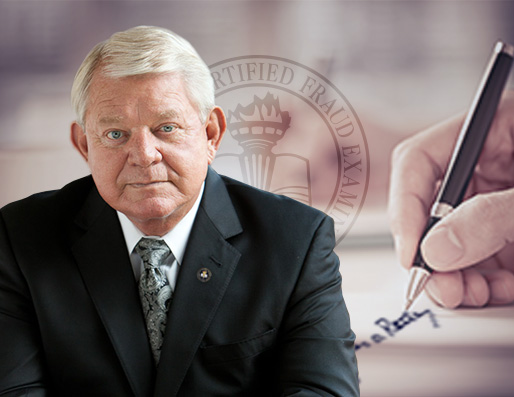FROM THE PRESIDENT
James D. Ratley, CFE
I've met many whistleblowers in my time, and what’s always resonated with me is that they persist despite nearly impossible odds. Dr. Sam Foote, a physician with a genius mind and audacious spirit, persisted when he found himself facing Goliath: the Phoenix Veterans Affairs (VA) Health Care System. When scandal rocked the department in Arizona, he didn’t back down.
In 2011, Foote penned his first letter to the VA Office of the Inspector General (OIG) to report waste, fraud and abuse by Gabriel Perez, then-director of the Phoenix VA. Foote had heard rumors that Perez’s mismanagement of funds had put the hospital $12 million in the hole. The national inspector general for the VA investigated the allegations that same year and Perez retired while inquiries were underway.
Any whistleblower would sigh with relief at this point: The OIG listened, the alleged fraudster was ousted, and now Foote and the hospital could move on. However, during Perez’s tenure, seven physicians left the hospital, and he never replaced them, which left the hospital with a provider shortage.
In 2012, Sharon Helman, who’d previously served as director of the VA hospital in Hines, Illinois, joined as head of the Phoenix VA and nearly a year later was reporting a decrease in patient wait times. But in the next year, Foote discovered secret patient wait lists. “In April of 2013, they [Helman and senior staff] made two lists: They made one electronic list that they would take on and off about 150 names that they actually reported to central office,” says Foote in Fraud Magazine's latest cover article. “Then they had another electronic list that did not report to central office.” Helman and the other administrators were claiming bonuses for decreased wait times — and patients were dying while waiting for care.
Foote again brought his concerns to the attention of the VA OIG, but this time he faced some resistance. He then sent letters to several government officials, including Sen. John McCain, R-Ariz. Eventually, the office of then House Rep. Jeff Miller, R-Fla., the chairman of the Committee on Veterans’ Affairs, responded. Miller put Foote in touch with a CNN producer, and on April 23, 2014, CNN broadcast an interview with Foote, and the story went viral.
Thanks to Foote’s tenacious efforts, further investigations would reveal that 293 veterans died while waiting for care. Multiple high-ranking officials, including Helman, have been placed on administrative leave or fired. And Foote continues to speak out as the VA saga continues.
At the 28th Annual ACFE Global Fraud Conference in Nashville, Tennessee, this past June, Foote received the 2017 Cliff Robertson Sentinel Award “for choosing truth over self.” He might have taken on Goliath, but just like the result of that epic battle, Foote is taking down the giant.









